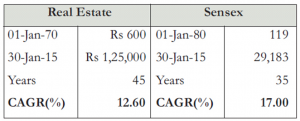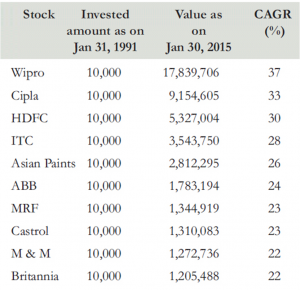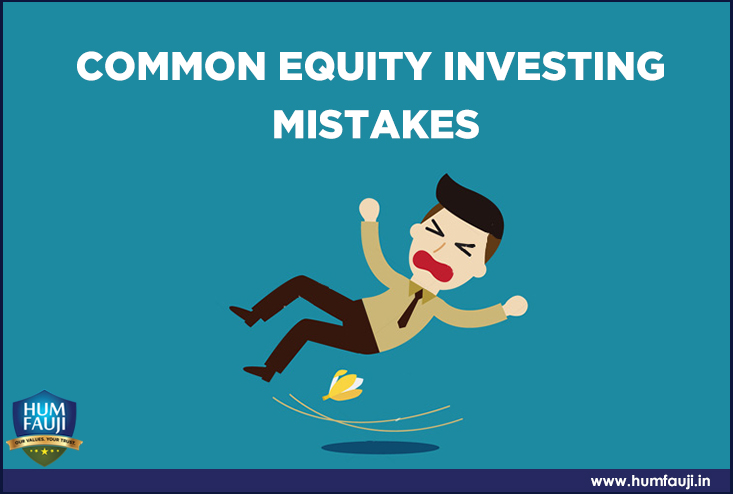“I made huge money in real estate, but not in equities.” You may well be one of those who will agree with this statement.
And it may be true. But have you ever wondered why you were not able to replicate the same with your equity investments? Both asset classes, after all, are known to deliver high double-digit returns in their own way in the Indian context.
What could differ is the approach you follow while investing in real estate and equity. You follow a few basic rules while investing in real estate. You will be surprised to know that you throw all these rules to the wind, and just do the opposite when it comes to equity investments. Let’s see what you subconsciously follow in real estate, and hardly bother to follow when it comes to equity.
Adequate Research and Due Diligence
As you are committing a large sum, you do adequate research before investing in a property. You enquire about the property with real estate consultants, local residents, banks, friends and relatives. You may also take the legal opinion from a lawyer to clarify the title and other legal issues.
Think about the stock in which you lost 90 per cent of your capital. It is likely that you invested in that stock based on a tip from your friend, or from a stockbroker. You would not have bothered to check the quality and credibility of the tip. If you had spared even a third of the effort you did for real estate, chances are you would have realised that it was not a good stock to invest. And who is to be blamed? The asset class called equity?!
Bargain Buying
A penny saved is a penny earned. Before buying a property, you mostly bargain with the seller to get a reasonable price. If the flat promoters are ready to offer a 10 per cent discount, you rush to buy from them.
You follow the exact opposite while investing in the stock market. The stock market is probably the only place where most people invest more in stocks when the prices are higher. Many of you may not be ready to buy a good stock even if it is available at a 50 per cent discount to its intrinsic value. You only buy it when everybody is buying it, that is, when the stock trades at dizzying valuations.
Long-Term Investment
You invest in real estate for the REAL long term and you are willing to hold it even for generations. Even in your worst financial situation, you will always try your level best to avoid selling real estate investments, and may, at best, prefer to take a loan against it. It’s a small wonder you reap the benefits of long-term investing!
Only 10 per cent of investors who invest in the stock market and equity mutual funds are known to hold their investments for more than three years. That means a majority are short-term investors and that’s bad news. You would have sold your holdings for a bit of profit in a rising market, or sold them at a huge loss in a falling market.
Only the truly long-term investors (just like real estate investors) gain superior returns over the long run.
Let us take the price of a premium sea-facing apartment – ‘Samudra Mahal’ in Mumbai. Its current price is Rs 1,25,000 per sq. foot. In 1970, the price in the location was Rs 600 per sq. foot. That means the price has increased by 208 times in 45 years. If you held on to your investment since then, you could have realised a Compounded Annualized Growth Rate (CAGR) of about 12.6 per cent per annum.
Let us take the equity scenario. If you had invested in the Sensex even 10 years hence (January-1980), and held on to your investment, it would have grown by 246 times in 35 years! That is a CAGR of about 17 per cent!
If you add the dividend received (about 2 per cent) from the index constituents, then the CAGR could be over 19 per cent. This is much higher than the returns generated by several of the premium real estate investments.
Several individual stocks could have delivered much more. The value of Rs 10,000 invested in the a few stocks on January 31, 1991 as on January 30, 2015, without any dividend reinvestment, is given in the table below.
Even from a prime location in Mumbai, you are making lesser return in real estate investments when compared with equity investments. And we are talking of such a performance at a time when Mumbai was the most growing real estate market!
Judicious Use of Leverage
While investing in real estate, many of you may not fund the entire amount from your pocket. You need bank funding for most of the amount. Normally, you try to increase your share to avoid paying a higher EMI.
Even though banks are ready to fund up to 80-85 per cent of the property value, you will try to mobilise funds from various sources to increase the down payment for your house. And in any case, banks ensure that you borrow based on your income and repaying capacity.
Thus, you judiciously use / are forced to use leverage while investing in real estate.
While investing in the stock market, you try to exploit the leverage option provided by your stock broker. A few of you may go overboard in futures and options using margin-funding limit, or with borrowed money. Volatile market movements could wipe out your margins, and your stockbroker might exit your positions for steep losses.
To summarize, the simple rules that you unknowingly follow for real estate is what provides you with decent returns; not so much the asset class per se. If only you followed the simple rules you did for real estate, then you should be able to build superior long-term wealth with equities too!
Note: Data and inputs from a presentation sourced from Kotak Asset Management.
For most individual investors, we would recommend investing in equity and debt mutual funds, rather than direct equity to get the best out of these vibrant asset classes.
Visit our Blog, https://humfauji.in/blog or facebook page http://www.facebook.com/HumFaujiInitiatives or follow us on Twitter https://twitter.com/#!/humfauji to get latest insight on matters financial














Leave a Reply